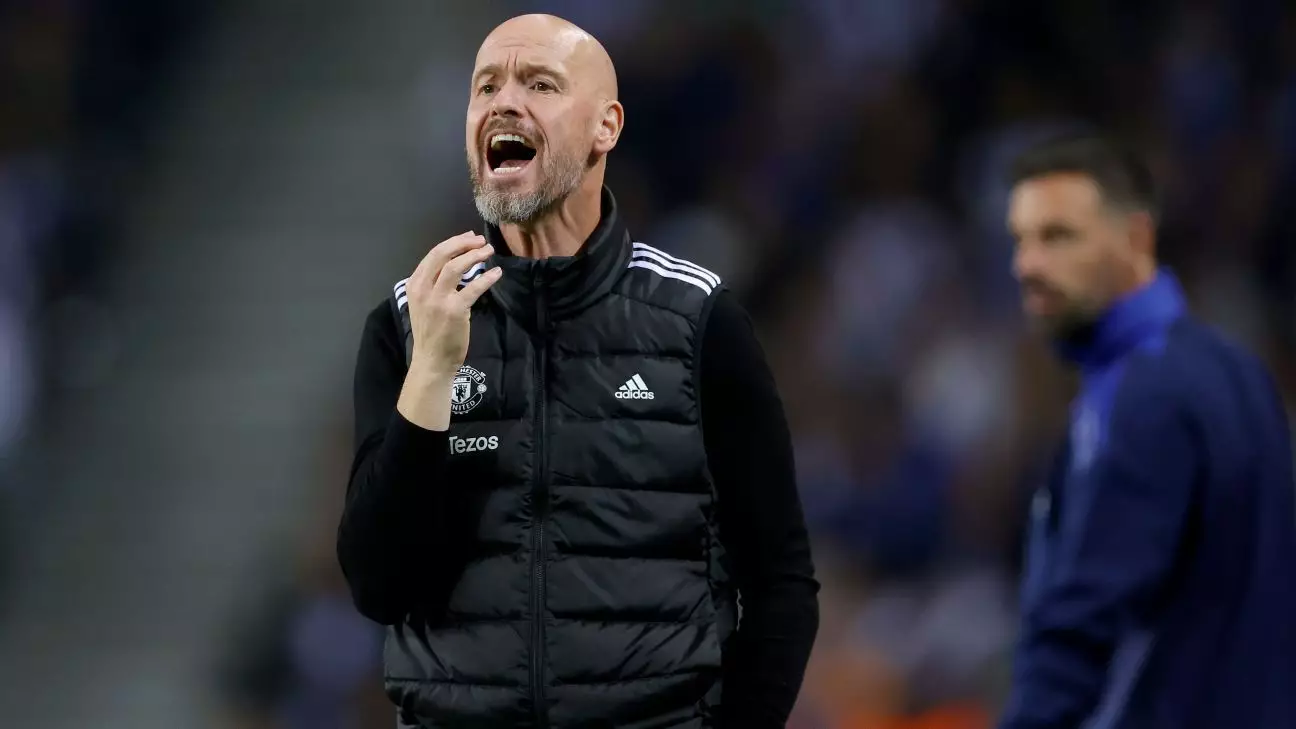The current landscape of football management is riddled with challenges, as coaches frequently find themselves under the spotlight, bearing the heavy burden of immediate expectations. Erik ten Hag, the manager of Manchester United, is no exception to this rule. As his team transitions through a turbulent phase, not only has he faced the incessant scrutiny regarding his strategies and results, but he has also called for a modicum of patience from both the club’s management and the fanbase.
As Ten Hag prepares his squad for the crucial game against Aston Villa, the emotional and mental toll of consecutive disappointing performances cannot be overlooked. A vivid illustration of this is the recent Europa League match against FC Porto, where Manchester United relinquished a two-goal advantage, culminating in a frustrating 3-3 draw. Such results leave scars not just on the scoreboard but also on the morale of players and fans alike. Currently, the club is grappling with four unbroken games without a victory, placing Ten Hag’s position precariously under the microscope.
The timing of these struggles could not be worse. With Villa recently basking in the glory of a remarkable Champions League win against Bayern Munich, they stand poised and eager to capitalize on any weaknesses in United’s armor. For Ten Hag, each match is saturated with the dual objectives of securing points and restoring confidence, both critical if he hopes to quell the growing unrest around Old Trafford.
One of the prevailing themes in Ten Hag’s commentary has been the notion of time—or the lack thereof. He candidly acknowledges the rush that comes with elite football, a realm where patience is often sacrificed at the altar of immediate results. “I’m not thinking about the pressure,” he insisted. Yet, the reality remains that the clock is ticking. It’s a relentless pursuit where the expectation for performance often overshadows the process of building a cohesive team.
The underlying message here is that, despite Ten Hag’s attempts to rejuvenate the squad by integrating new talent, the complexities inherent in blending these players should not be underestimated. He referenced the struggles of summer signing Manuel Ugarte, emphasizing the necessity of acclimatization to a new system and the pressures of the Premier League. Ten Hag’s recognition of this challenge shines a light on a broader issue facing teams who undergo significant restructuring – not everyone will fit seamlessly into the existing framework without time to adapt.
The introduction of young players is another aspect of Ten Hag’s strategy, yet it presents its own set of hurdles. Feedback from the manager suggests that new arrivals like Ugarte require patience, and this is likely true for others as well. The integration of talented but inexperienced players can be a double-edged sword; while they bring potential and vigor, they can also disrupt established team dynamics if not nurtured properly. Ten Hag seems to believe that his approach, while perhaps tedious in the short term, is necessary for long-term success at the club.
Ten Hag’s comments regarding Rasmus Højlund’s condition further emphasize the importance of physical fitness and readiness as integral to team performance. The managerial puzzle is compounded when key players are unavailable, leaving gaps in strategy and execution that can have cascading effects on match outcomes.
In anticipation of the Villa matchup, Ten Hag’s thoughtful navigation of the current situation is commendable. With the captain, Bruno Fernandes, back in contention following the overturning of his red card, there is hope for a revitalized approach against a confident opponent. Yet, Ten Hag remains cautious, awaiting updates on injured midfielder Kobbie Mainoo, indicative of his ongoing battle to field a strong and fit lineup.
Ultimately, the path forward will require both a deft balancing act of expectations and an unwavering focus on development. The journey might be arduous, but for managers like Ten Hag, it is a matter of surviving the current pressures while laying the groundwork for future triumphs. As Manchester United confronts these challenges, they must hope that patience can eventually harmonize the demands of immediate success with the far-reaching vision of sustained excellence.

